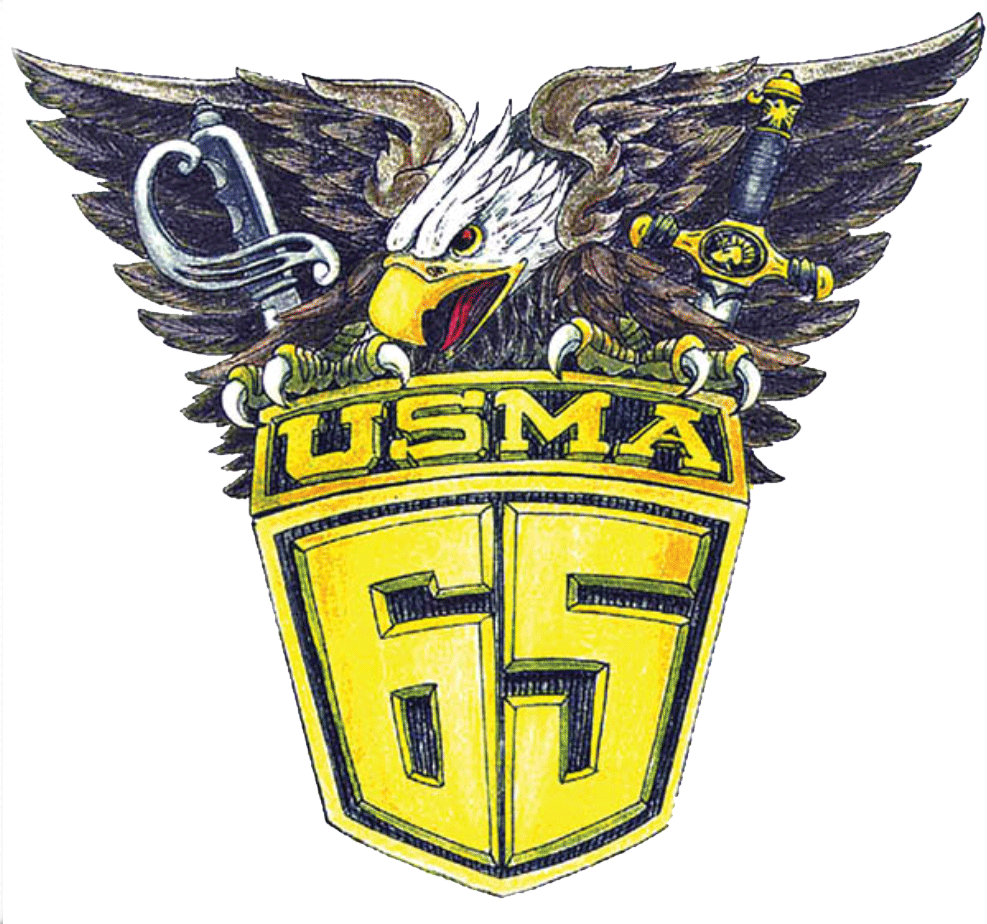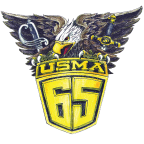CARL ROBERT ARVIN was born in Ypsilanti, Michigan, on 19 January 1943, the son of Carl and Dorothy Arvin. Devoted to his parents and David, a younger brother, “Bob” spent a happy youth in Ypsilanti, nurtured in its wholesome environment by a very supportive family and by his Catholic faith. A mutual devotion and admiration developed between Bob and his hometown. It remained his home, proudly recording the achievements of his young life, and mourning his loss as a native son and future leader in his chosen profession.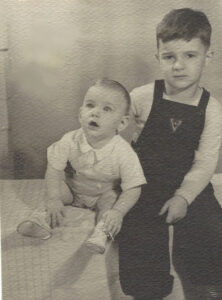
At Ypsilanti High School, Bob demonstrated the intellect, athletic ability, and leadership qualities, which were the foundation of his subsequent achievements. He participated in numerous high school activities ranging from debating to quarterbacking the football team. An outstanding wrestler, he captured the 154 pound state title in his senior year and captained the wrestling team. Bob was a member of the National Honor Society, president of the student council his junior year, and class president his senior year. He capped his brilliant high school career as valedictorian of his graduating class. His athletic director remembers Bob as “one of the outstanding students and leaders to graduate from Ypsilanti High.” Bob’s high school achievements led to several college scholarships, including an appointment to West Point, the fulfillment of a boyhood ambition and his ultimate choice.
Bob entered West Point in July, 1961 as a member of the Class of 1965. He quickly established himself as a class leader. At Camp Buckner, he was selected as the outstanding Third Classman. While maintaining high grades academically, he supported a number of extracurricular activities. He became one of the top intercollegiate wrestlers in the nationally competitive East Coast Intercollegiate Association and was named as captain of the Academy’s 1964-65 season.
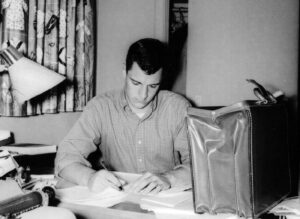 His First Class year culminated one of the most outstanding cadet careers in West Point’s proud tradition. Bob’s number one standing in military efficiency and leadership was recognized by his appointment as First Captain and Brigade Commander. His athletic achievements continued as he led the Army wrestling team to its best year ever, including a tie with favored Navy. Despite the demands of his First Captaincy and intercollegiate athletic competition, Bob continued his extracurricular activities and represented West Point at numerous conferences and functions across the country. He edited the “HOWITZER,” was a Rhodes Scholarship finalist, and was among a group of college students selected to discuss public affairs with President Lyndon Johnson at the White House. While achieving these many honors, Bob considered his service in the Cadet Catholic Chapel as an acolyte and member of the Chapel Choir as among the highlights of his cadet years.
His First Class year culminated one of the most outstanding cadet careers in West Point’s proud tradition. Bob’s number one standing in military efficiency and leadership was recognized by his appointment as First Captain and Brigade Commander. His athletic achievements continued as he led the Army wrestling team to its best year ever, including a tie with favored Navy. Despite the demands of his First Captaincy and intercollegiate athletic competition, Bob continued his extracurricular activities and represented West Point at numerous conferences and functions across the country. He edited the “HOWITZER,” was a Rhodes Scholarship finalist, and was among a group of college students selected to discuss public affairs with President Lyndon Johnson at the White House. While achieving these many honors, Bob considered his service in the Cadet Catholic Chapel as an acolyte and member of the Chapel Choir as among the highlights of his cadet years.
Graduation in June 1965 was certainly a time of sweeping emotion for Bob. It culminated one period of high personal achievement and initiated a promising career as a second lieutenant in the Infantry.
Following graduation, he returned to Ypsilanti, renewing friendships, particularly that of his high school girl friend, Merry Lynn Montonye. A proud Ypsilanti citizenry turned out for its traditional 4th of July parade to celebrate and to honor Bob who served as parade marshal.
In August 1965 Bob reported to Fort Benning, Georgia, for Airborne and Ranger training. He intended to prepare himself as well as possible for his assignment to the 82d Airborne Division at Fort Bragg, North Carolina. His selection of the 82d Airborne Division as his first assignment was indicative of his desire to serve “up front.” He also felt the Division’s readiness and rapid deployment mission would best meet this need.
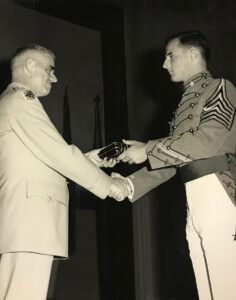 In the brief span of 23 months’ service in the Division, Bob demonstrated outstanding professional competence and leadership. After a brief stint as a platoon leader and executive officer, he became the youngest company commander in the Division. His lack of experience proved no handicap, however, as Bob earned the admiration of his soldiers and fellow officers through competence, integrity, diligence, and concern for his soldiers’ welfare. During this tour of duty, Bob managed a brief but pleasant interlude in his duties. He returned home to Ypsilanti in July, 1966, and married Merry Lynn Montonye in St. John’s Church. He was selected as aide-de-camp to the Assistant Division Commander. Though brief, Bob’s tour in the Division was one of accomplishment and earmarked him as a leader of great promise.
In the brief span of 23 months’ service in the Division, Bob demonstrated outstanding professional competence and leadership. After a brief stint as a platoon leader and executive officer, he became the youngest company commander in the Division. His lack of experience proved no handicap, however, as Bob earned the admiration of his soldiers and fellow officers through competence, integrity, diligence, and concern for his soldiers’ welfare. During this tour of duty, Bob managed a brief but pleasant interlude in his duties. He returned home to Ypsilanti in July, 1966, and married Merry Lynn Montonye in St. John’s Church. He was selected as aide-de-camp to the Assistant Division Commander. Though brief, Bob’s tour in the Division was one of accomplishment and earmarked him as a leader of great promise.
Bob received orders for Vietnam in early 1967, assigning him as an advisor in the Military Assistance Command Vietnam (MACV). He reported to his advisory detachment, the 7th Vietnamese Airborne Battalion, in May 1967. The pace and intensity of the war were quickening, thrusting Bob’s unit into combat early in his tour. For combat actions on 5 September 1967 he was awarded the Silver Star and Purple Heart. Following a brief hospitalization, Bob returned to his battalion, which was preparing for combat operations to clear enemy forces from an area threatening a vital air base at Hue-Phu Bai, located in the northernmost province of the Republic of Vietnam. As dusk approached on 8 October 1967, Bob’s unit was completing a sweep of a suspected enemy base when an entrenched enemy regiment was engaged. The intensity of the enemy’s fire pinned down Bob’s unit in an exposed, untenable position. Realizing that a portion of his battalion must maneuver to dislodge the threatening elements of the enemy force, Bob joined the maneuver force to assist and coordinate supporting fires. He repeatedly exposed himself to enemy fire as he moved about directing supporting fires. In moving forward with his Vietnamese counterpart, Bob was mortally wounded by small arms fire and died on the field of battle. His heroic actions in the battle assisted his battalion in defeating a superior enemy force and were recognized by an award of a second Silver Star.
Bob’s body was returned to Ypsilanti to lie in state in St. John’s Church, the first layman to do so in that church. Two days later, a Catholic funeral mass, in which a Protestant minister assisted, was conducted in the same church. Bob’s death had once again united his loved ones and hometown in heart and prayer.
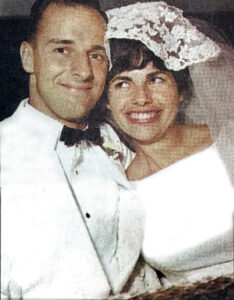 Bob was buried at West Point on 17 October 1967 with military honors. Those in attendance were representative of his life as an accomplished youth, devoted son and husband, outstanding cadet, and young Army Officer with great leadership promise. Mourners included his wife, parents, other relatives, several classmates, members of the cadet wrestling team, his former Assistant Division Commander in the 82d Airborne Division and the Superintendent of the Academy during a portion of Arvin’s cadet career. Services were conducted by the Rector of the Cadet Catholic Chapel. In a subsequent letter to Arvin’s parents, General William C. Westmoreland, Commander of United States military forces in the Republic of Vietnam, wrote, “He was one of the most outstanding young men I have had the privilege of knowing. The Army has lost one of its future leaders.”
Bob was buried at West Point on 17 October 1967 with military honors. Those in attendance were representative of his life as an accomplished youth, devoted son and husband, outstanding cadet, and young Army Officer with great leadership promise. Mourners included his wife, parents, other relatives, several classmates, members of the cadet wrestling team, his former Assistant Division Commander in the 82d Airborne Division and the Superintendent of the Academy during a portion of Arvin’s cadet career. Services were conducted by the Rector of the Cadet Catholic Chapel. In a subsequent letter to Arvin’s parents, General William C. Westmoreland, Commander of United States military forces in the Republic of Vietnam, wrote, “He was one of the most outstanding young men I have had the privilege of knowing. The Army has lost one of its future leaders.”
Bob provided each and everyone of us a personal example by which to lead our lives. We carry the burden of his loss and shall strive to follow that example.
This was beautifully written by Bob’s classmates and close friends, John Johnson and Chuck Moseley. United States Military Academy at West Point.
